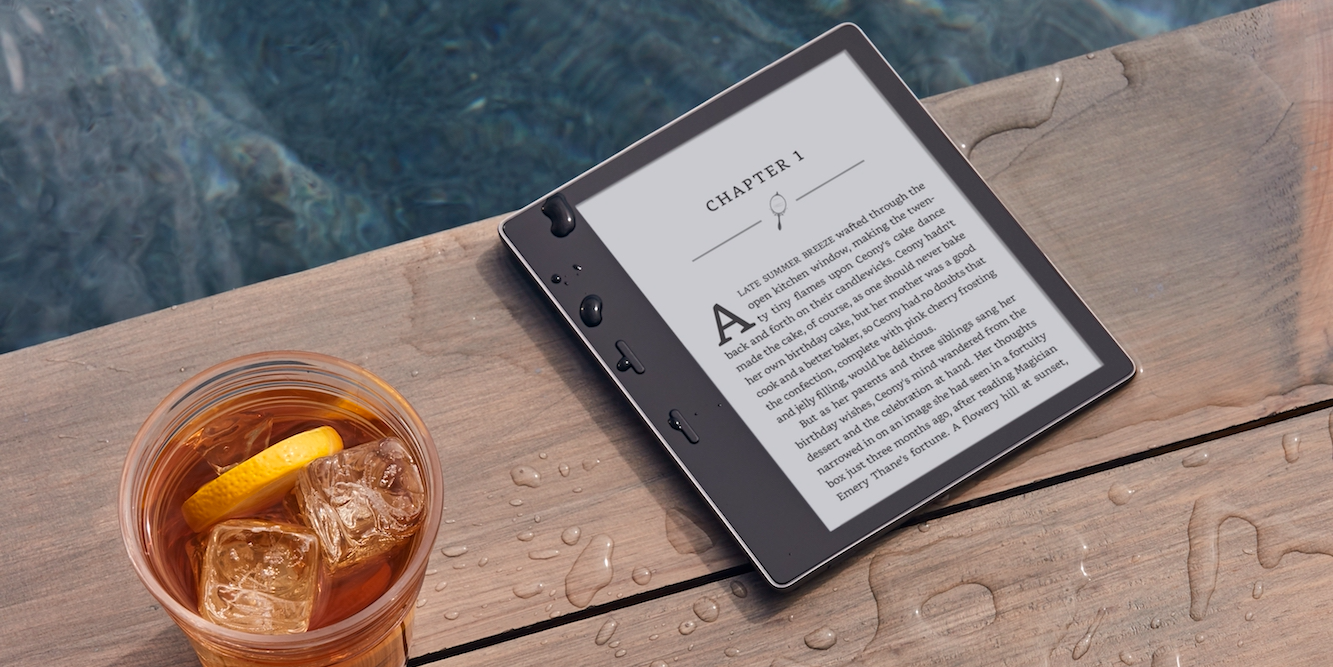Reviewers of the new Kindle Oasis say its durability, waterproofing, bluetooth functionality, and increased screen size make it a top contender on the e-reader market.At $250, it’s one of the pricier e-readers you’ll find, and reviewers are split on whether or not the e-reader justifies its steep post.
Reviews are out for the 2017 Oasis Kindle, Amazon’s latest e-reader that boasts waterproof casing, a larger screen, and bluetooth functionality.
The verdict? A premium product saddled with a premium pricetag. With its sleek physicality (a tapered grip at the back of the device and page-turning buttons), increased screen size, and durable design, the device is an improvement on Amazon’s original Oasis model and, for those who can afford it, worth the hefty price of $250.
Reviewers praised its 8GB of storage (it’ll run you about $30 more for 16GB more storage), automatic-brightness setting, and extended battery life (used in moderation and with wireless and Bluetooth off, you’ll only need to recharge every six weeks). But reviewers were divided over the new Oasis’s design: the page-turning buttons are a throwback to the device’s original model, lending it a satisfying physicality – a distinct click with each turn of the page – that’s been conspicuously absent from Amazon’s latest iterations. Those accustomed to seamlessly turning a page with a flick of their finger on the Kindle Paperwhite might find themselves at odds with this new feature — but the Oasis allows for a clever compromise: allowing readers to forgo the buttons altogether and opt to turn the page with a finger-flick.
But mostly, reviews were positive. If you’re game to plunk down nearly $300 on an e-reader, this is the e-reader you’ll want to buy. Here’s what reviewers had to say:
David Carnoy of CNET highlighted the new Kindle Oasis's improved durability but felt the $250 price tag ultimately wasn't worth it:
"The larger screen, more durable aluminum chassis and full waterproofing are important upgrades that put the new Kindle Oasis at the top of the e-reader class. Sure, it's a little crazy to spend this much for an e-reader, but then again, people have been known to overspend on smartphones, noise-cancelling wireless headphones and a lot of other products. Why not a fancy Kindle?"
"While the new Kindle Oasis on paper is less expensive than the original Oasis, $250 is still a lot to spend on an e-reader. Is it that much better than the Kindle Paperwhite? No, it isn't."
Henry T. Casey of Tom's Guide gave the new Oasis an eight out of ten rating. The product, he says, has great design, especially if you have plans to read underwater. However, Casey suggests that the page-turning buttons might rub some readers the wrong way:
"Unlike the similarly water-resistant Kobo Aura One (which survived 60 minutes in 6-inch waters), the Oasis stayed functional throughout its swim, and its screen and buttons responded to taps and clicks throughout the test as if nothing unusual were taking place. I hadn't originally planned to use the tablet inside the tank during the test, but when I saw that its screen stayed on the same page it was on before I dunked it I had to see if the Oasis was still working, and I was seriously impressed by how well it held up."
"That wider design, and its physical buttons, may not sit right with existing e-reader users.When I showed the Oasis to my mother, the most avid Kindle user I know, she found the buttons unnecessary. That's because she prefers swipe-based page navigation - which is still available in the Oasis - because it reminds her of flipping actual pages."
Brian Heater of TechCrunch describes the Kindle Oasis as the best Kindle out there, but with a pricepoint that will make it marketable to only a niche group of readers:
"It handily grabs the title of the best Kindle ever, and is a pretty solid contender for best devoted e-reader ever. The new Oasis walks that eternal e-reader tightrope between forced simplicity and new features - and mostly succeeds. It's a bold acknowledgement on the 10th anniversary of the original Kindle that the category is still going reasonably strong."
"At $270, it's targeted at a niche of a niche, but in 2017, it's easily the ultimate high-end e-reader experience for people who want to tune out the notifications and read the day away."
Engadget's Devindra Hardawar recommends the Kindle Oasis for its crisp resolution and increased screen size but took issue with the e-reader's metal case:
"After years of staring at 6-inch e-ink screens, the Oasis's 7-inch display feels like a breath of fresh air. It still offers a crisp 300-pixel-per-inch (ppi) resolution, but it can hold 30 percent more text than before. Twelve LEDs also make its backlighting more uniform than on cheaper Kindles."
"The metal case also has some surprisingly sharp edges around the edges. It's not the sort of thing that could cut you, but it makes some noticeable impressions on your skin when you hold it for a while. Simply put, the new Oasis just isn't as comfortable as the last model. Even the cheaper Paperwhite rests more easily in your hands."
Casey Newton at The Verge praised the Kindle Oasis for its purposefully limited functionality, but wondered if your money wouldn't be better spent on a cheaper product:
"Despite what it calls an "experimental" browser, it is not designed for extensive web surfing. The promise of the Kindle is that you can leave the rest of the world behind for a while, so as to better surrender yourself to the story you have chosen. It is a single-purpose tool, but that purpose is powerful, and explains the enduring appeal of the Kindle in a world that has largely passed it by."
"And yet at $250 for a Wi-Fi-only, 8GB Oasis, it still feels like more than all but the most dedicated of readers will be willing to spend. A Wi-Fi-only Amazon Fire tablet with 8GB of storage can be had for $50 - and will give you the entire internet in return. A $120 Kindle Paperwhite offers a very similar reading experience, minus the water resistance or Audible features, for less than half the cost. A new iPad is considerably more expensive, but offers a much wider range of functions in return."

